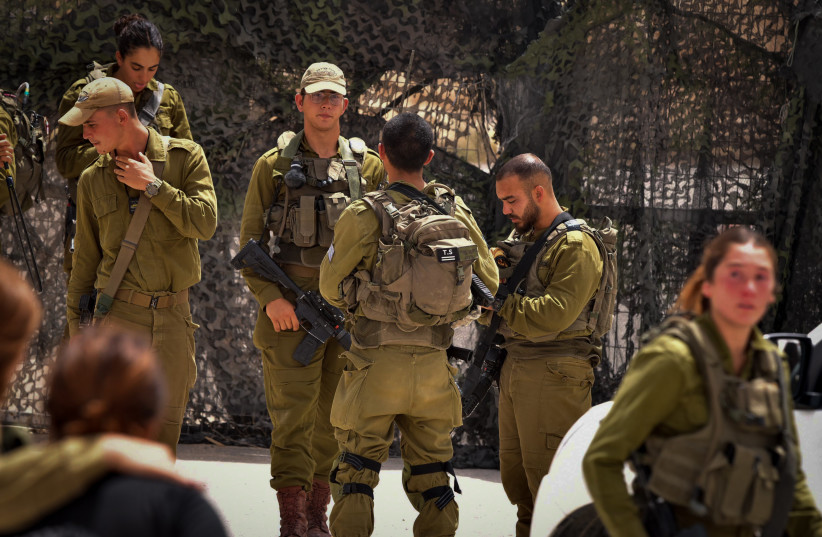A discussion on a radio program on Sunday about the incident at the weekend along the Egyptian border in which three Israeli soldiers were killed by an Egyptian policeman is an indication of one of the central aspects of the affair: The two presenters debated whether the incident should be referred to as a “pigua” (terrorist attack) or a “takrit yeri” (shooting incident).
It’s not a matter of mere semantics. The soldiers were killed in the line of duty while on active service on the Egyptian border, making it a military matter. On the other hand, the perpetrator was an Egyptian policeman-turned-terrorist.
The bodies of two of the soldiers, Sgt. Lia Ben-Nun and St.-Sgt. Uri Itzhak Ilouz, were discovered at their guard post on Saturday morning by a team sent to check on them when they failed to answer their radio. A search for the killer was immediately launched. A third soldier, St.-Sgt. Ohad Dahan, was killed in an exchange of fire between Israeli forces and the terrorist, who was shot dead by the forces.
Egyptian officials' reactions to the attack
The Egyptian Army initially issued a statement that said the Egyptian man was a police officer who was chasing drug smugglers, and that “during the chase, the security man was involved in an exchange of fire that caused the deaths of three Israeli soldiers.” It did not explain how the police officer ended up in a shootout with IDF soldiers when he should have been chasing drug smugglers. In a tweet, the Egyptian Army expressed condolences “to the victims on both sides,” infuriatingly equating the murderous rogue police officer with his victims.
Egyptian Defense Minister Mohamed Zaki had offered his condolences to his Israeli counterpart in a phone call, the Egyptian Army said, adding that the two ministers discussed taking necessary measures to prevent the recurrence of border shooting incidents.

The incident has obviously caused embarrassment in Egypt. As more details emerged on Sunday, reports said the Egyptian had crossed the border armed with a knife, gun and ammunition, food and had a copy of the Koran in his bag, making it clear that this was a planned, deliberate terrorist attack, despite the Egyptians’ initial statement. It was not yet known whether he acted alone or had accomplices on either side of the border.
Our relationship with Egypt is of vital importance to both Israel and the Egyptians. The two countries share a long border of some 200 km., which is generally considered quiet, despite ongoing drug-smuggling incidents. A security barrier was built in 2013 to block the flow of illegal migrants from Africa to Israel via Egypt and prevent Islamic State-affiliated terrorists from infiltrating. The wall has contributed to the calm.
We are encouraged that the Egyptian authorities agreed to a joint investigation and appear to be taking the incident seriously. It is important for both sides to fully investigate what happened and how to prevent such an incident from recurring. At the same time, it is also essential that the investigation does not affect the strong diplomatic and security ties that exist between the two countries.
Israeli officials stressed that the incident, resulting in the tragic loss of the soldiers’ lives, was unusual. At the start of Sunday’s cabinet meeting, Prime Minister Benjamin Netanyahu described the incident as “grave and exceptional,” adding that Israel had sent a message to Egypt that the joint investigation needs to be thorough, “as part of the important security cooperation between us, which has benefited both countries over the years.”
Egyptian-Israeli relations
In 1978, Egypt became the first Arab country to sign a peace agreement with Israel, and despite ups and downs in the relationship, it has remained generally a strong one, particularly regarding security cooperation. The government of President Abdel Fattah al-Sisi is well aware that the main threat from Islamist extremists is to Egypt itself. There has been significant coordination in the fight against Islamic State and other jihadist elements in Sinai and in combating the terrorist threat in Hamas-controlled Gaza.
As The Jerusalem Post’s Seth J. Frantzman noted Sunday, “Cairo has turned into one of Jerusalem’s most important allies in the region, and despite the pain and anger over the death of the three IDF soldiers, that relationship needs to be maintained.”
It is vital that security and diplomatic cooperation between Israel and Egypt not only continue, but that it is boosted to prevent further incidents and threats to both countries.
